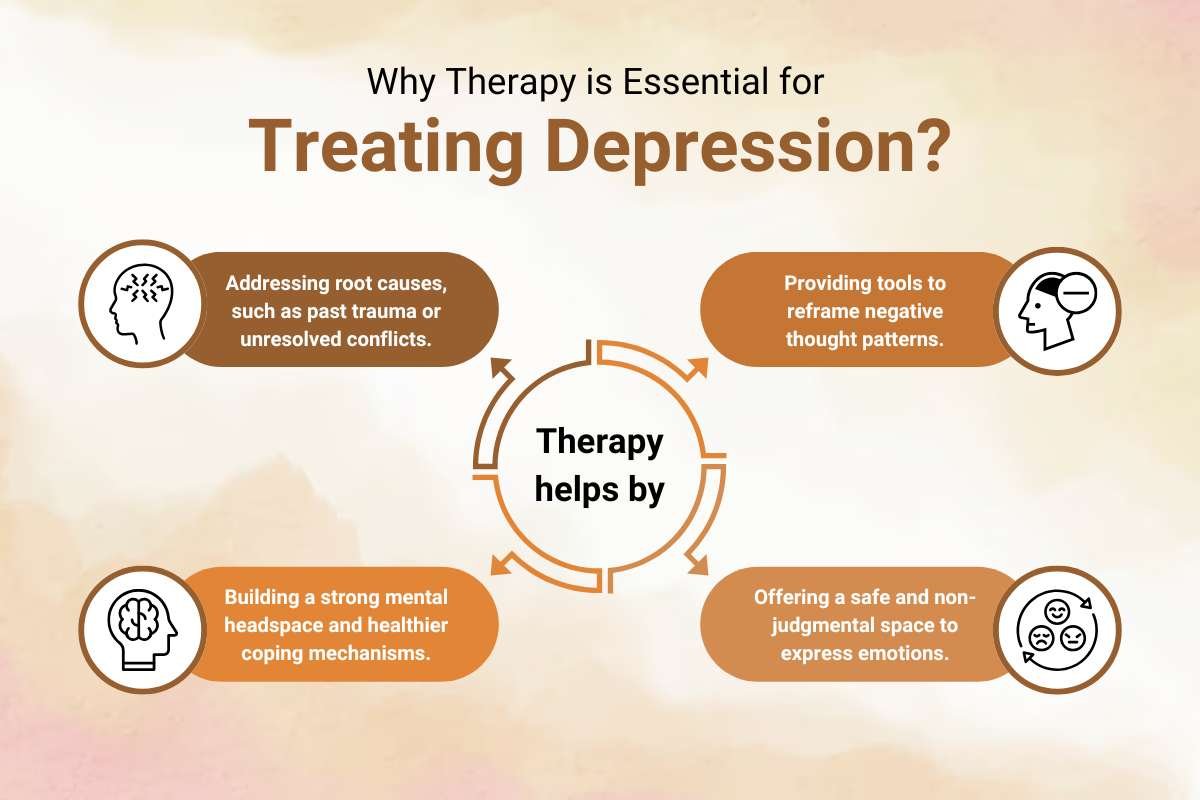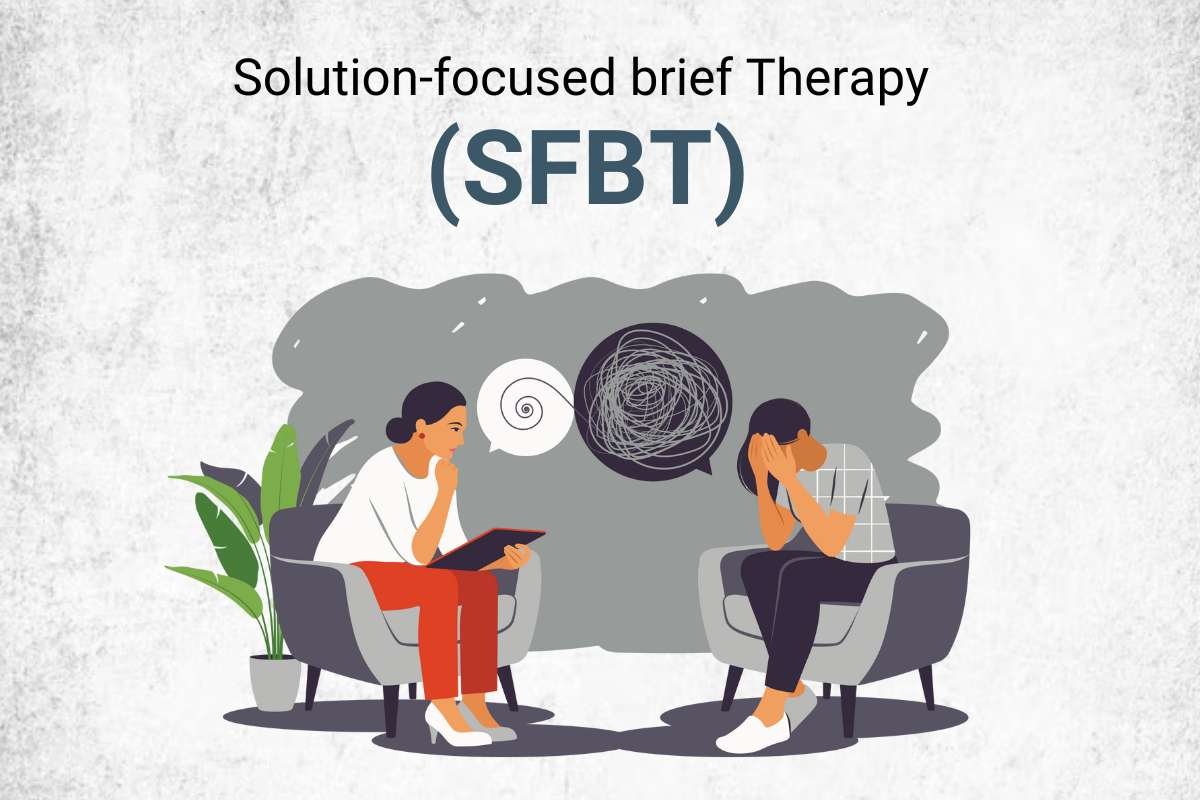We may have things bottled up due to the experiences that we have endured. Scenarios that trigger us. Trauma that haunts us. All of these push us into the zone of depression. Repercussions of actions, guilt trips, and questioning the reality are among the things that lead to depression. It is one of the most common mental health conditions affecting millions worldwide. The need for addressing traumatic incidents is important to maintain a healthy mindset. It can be done through therapeutic sessions. Types of Therapy for Depression is a series of sessions that aim to treat various mental health issues. It plays a crucial role in addressing all those overwhelming feelings.
Are you feeling stuck in the dark cycle of thoughts? This blog will explore the different types of therapy for depression, and their techniques and help you choose the right one based on your needs.
Why Therapy is Essential for Treating Depression?
Depression is not just about feeling sad. It affects the way a person thinks, behaves, and interacts with the world.
Therapy helps by:
- Addressing root causes, such as past trauma or unresolved conflicts.
- Providing tools to reframe negative thought patterns.
- Building a strong mental headspace and healthier coping mechanisms.
- Offering a safe and non-judgmental space to express emotions.
What Are The Different Types of Therapy For Depression?

Overcoming our issues can be challenging. We feel like we are stuck in the dark, and there is no ray of hope.
Individuals have several mental health issues that lead to depression. Each of the below therapeutic models has various benefits and is efficient for several mental health conditions.
Here are some of the effective types of therapy for depression:
1. Cognitive Behavioral Therapy (CBT)
You might find yourself trapped in the never-ending loop of negative thoughts and constant questions of self-doubt, leading to an increase in anxiety and depression. Cognitive Behavioral Therapy (CBT) is a form of therapy that helps individuals identify and challenge negative thought patterns that contribute to depression. By understanding how thoughts, feelings, and behaviors are interconnected, individuals can learn to develop healthier coping mechanisms and improve their overall well-being. CBT sessions involve collaboration between a therapist and the individual to identify and address negative thought patterns. CBT is one of the best types of therapy for depression and helps you break free from the loop of negative rumination.
2. Dialect Behavioral Therapy (DBT)
Dialectical Behavior Therapy (DBT) is one of the most effective types of therapy for depression.
DBT is a type of CBT that encourages individuals with depression to acknowledge and accept negative thought patterns. It was initially designed for individuals with suicidal thoughts and borderline personality but is best effective for treating depression. You can opt for this therapy to reduce the stress of negative rumination. Therapists will teach you the practice of validation. Through this, you can learn to accept your negative emotions, regulate stress, and incorporate positive changes for improved relationships. Tasks like maintaining a journal to record your negative thoughts help you control your patterns.
3. Interpersonal Therapy

IPT focuses on improving interpersonal relationships, as difficulties in relationships can lead to depression. It is one of the most effective types of therapy for depression that helps you improve your conflict-resolution skills and healthier communication. Therapists help you identify and address interpersonal problems, such as conflict and grief. They teach communication skills and strategies for building and maintaining healthy relationships.
4. Psychodynamic Therapy
Psychodynamics is one of the oldest types of therapy for depression. This theory was developed by Sigmund Freud and Carl Jung in the late 19th and early 20th centuries. It focuses on how past experiences influence current emotions and behaviors leading to depression. Psychodynamic theory will help you find peace with unresolved conflicts and identify negative thought patterns, relationships, and emotions. The effectiveness of this therapy is growing and is supposed to be long-term.
5. Behavioral Therapy
Behavioral therapy identifies and helps change self-destructive thoughts and unhealthy behaviors. The treatment focuses on current problems and how to change them. It helps you dodge unhealthy habits and build new, positive ones. Gradually implementing the therapy will result in positive behaviors, and you can overcome anxiety, depression, and other mental health challenges. It’s a practical approach to mental health that can lead to lasting change.
6. Acceptance and Commitment Therapy (ACT)
Acceptance and commitment therapy (ACT) persuades an individual to stop denying, avoiding, and struggling with their inner battles. It teaches you to accept your thoughts and feelings without judgment. Instead of fighting against them, ACT helps you choose actions that align with your values. ACT’s main motive is to instill psychological flexibility in a person to accept changes. ACT is among the effective types of therapy for depression, helping you to overcome anxiety, depression, and other mental health issues.
7. Solution-focused brief Therapy (SFBT)

Psychotherapy is one of the common types of therapy for depression, focusing on your past experiences to understand how they influence current thoughts and behaviors. Traumatic experiences disrupt the practical thinking and decision-making process, leading to overthinking. Psychotherapy focuses on the roots of the problem affecting your present thought patterns. However, simply identifying the problem isn’t always enough. Solution-Focused Brief Therapy (SFBT) takes a proactive approach by focusing on strengths and skills. This therapy empowers you to use your positive qualities to overcome negativity and improve your overall well-being.
Conclusion
Mental health is affected by various reasons, eventually pushing us into a dark space (depression). Staying mentally fit has been challenging. Traumatic experiences can take a toll on our lives, affecting our emotional and physical states and perception of life. It is important to identify the negative thought patterns and overcome them for healthy well-being. These various types of therapy for depression sessions provide a safe ground to express your thoughts, feelings, and emotions without judgment. There are different types of depression, and choosing the right ones that cater to your needs helps you find the right mental balance.









